CATEGORIES
Kategoriler

THE FRENZY Joyce Carol Oates
Early afternoon, driving south on the Garden State Parkway with the girl beside him.

LEAVE WITH DESSERT
Graydon Carter’s great magazine age.

JUST BETWEEN US
The pleasures and pitfalls of gossip.

THE BOOK OF RUTH
How an American radical reinvented back-yard gardening.

Hard-earned skills are key to this family's blue economy success
Dan Hitchcock's first foray into the Blue Economy wasn't intended to be permanent. Instead, Hitchcock's summertime job, working on the Isle au Haut mailboat, was a way for the self-described ski bum, who grew up in western Maine, to earn enough money to get back to Colorado where he planned to live.

Mariners lacrosse teams combine to go 4-0 in huge week
The Maine Maritime Academy women’s lacrosse team logged a perfect week with a pair of impressive non-conference wins.

After 50 years in education, Snow retiring from school board
After 12 years on the Blue Hill school board, chair Jan Snow will retire when her term expires in April.
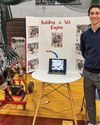
Students to showcase independent study projects
On Wednesday, March 19, from 5 to 7 p.m., George Stevens Academy will host its annual Independent Study and Internship Program (ISIP) Student Exhibition.

GSA and local boutique partner for prom 'shopping' experience
Donated attire will be free to local students

Students to showcase independent study projects
The event, which will take place in the GSA gym, will showcase the program experiences of approximately 120 11th and 12th grade students. The event is open to the public, according to a press release, and community members are invited to see the exhibits and hear directly from the students about their projects.
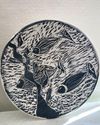
DIAA March artist a longtime multifaceted creator
The Deer Isle Artists Association announces that David McBeth is the March Artist in Residence.

Naomi Fry on Jay McInerney's "Chloe's Scene"
As a teen-ager, long before I lived in New York, I felt the city urging me toward it. N.Y.C., with its art and money, its drugs and fashion, its misery and elation—how tough, how grimy, how scary, how glamorous! For me, one of its most potent siren calls was “Chloe’s Scene,” a piece written for this magazine, in 1994, by the novelist Jay McInerney, about the then nineteen-year-old sometime actress, sometime model, and all-around It Girl Chloë Sevigny.

INHERIT THE PLAY
The return of “A Streetcar Named Desire” and “Ghosts.”

UPDATED KENNEDY CENTER 2025 SCHEDULE
April 1—A. R. Gurney’s “Love Letters,” with Lauren Boebert and Kid Rock

INTERIORS
The tyranny of taste in Vincenzo Latronico’s “Perfection.”

YOU MAD, BRO?
Young men have gone MAGA. Can the left win them back?

ONWARD AND UPWARD WITH THE ARTS BETTING ON THE FUTURE
Lucy Dacus after boygenius.

STEAL, ADAPT, BORROW
Jonathan Anderson transformed Loewe by radically reinterpreting classic garments. Is Dior next?

Slowing traffic, paving roads among 2025 Deer Isle select board priorities
Newly sworn in after being elected, Patricia “Patty” Oliver was ready for business at her inaugural meeting of the Deer Isle Select Board on Thursday, March 6. The three members of the select board are now Oliver, Peter Perez and Ronald “Ronnie” Eaton.

OFIP hosts Black Balloon Day
Students at the Deer Isle-Stonington High School participated in honoring those lost to overdose on Black Balloon Day, March 6, in partnership with the Opiate-Free Island Partnership.
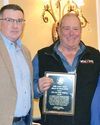
DMR presents local couple with excellence award
Department of Marine Resources Commissioner Patrick Keliher presented John and Judy Williams of Stonington the annual DMR Andy Mays Award of Excellence at the recent Fishermen's Forum in Rockport.
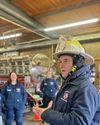
Library hosts story time with firefighters
Children also get firsthand look at fire station
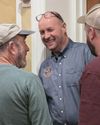
Fisheries scientist with local ties nominated to lead DMR
Carl Wilson is state’s longtime lead lobster biologist

For second year in a row, student actors head to state finals
THE ISLAND—Deer Isle-Stonington High School students' theater production of Treasure Island has won the Downeast Maine Class B Regional on Mount Desert Island, sending the show to the state final on Friday and Saturday, March 21-22, in Millinocket. DISHS also won the annual MDI Tech Olympics at the event.

Fisheries scientist with local ties nominated to lead DMR
Carl Wilson is state's longtime lead lobster biologist
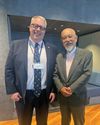
Championing MMA: A sit-down with Craig Johnson
Interim president focuses on boosting enrollment, keeping graduates competitive

Local students shine at Fishermen's Forum
Students from Deer Isle-Stonington High School and George Stevens Academy took center stage on Friday, February 28, at the 50th annual Maine Fishermen’s Forum in Rockport to display and explain research projects they had completed as part of the Eastern Maine Skippers Program.

Students to showcase independent study projects
On Wednesday, March 19, from 5 to 7 p.m., George Stevens Academy will host its annual Independent Study and Internship Program (ISIP) Student Exhibition.

FSR 4 SET TO ELEVATE PS5 PRO GRAPHICS IN 2026: A CLEARER PICTURE AHEAD
PlayStation's lead architect Mark Cerny dropped a tantalizing hint about the PS5 Pro's future, revealing that AMD's new FSR 4 upscaling technology will shape the \"next evolution\" of the console's PlayStation Spectral Super Resolution (PSSR).

IROBOT LAUNCHES EIGHT NEW ROOMBAS WITH LIDAR MAPPING
This week, iRobot unveiled its most ambitious lineup yet, introducing eight new Roomba models that bring lidar mapping to the brand for the first time.